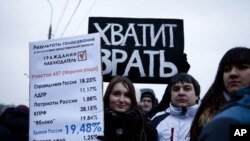Protesters came out across the world’s largest country to demand clean elections and to say what, only one week ago, was unsayable.
“Russia Without Putin” was the favorite chant of thousands of demonstrators who marched within earshot of the Kremlin in the largest pro-democracy demonstration since Vladimir Putin came to power in 2000.
From Vladivostok on the Pacific Coast to Kaliningrad on the Baltic, tens of thousands of Russians turned out to protest what they called blatant fraud in last Sunday’s parliamentary elections.
Standing on Revolution Square in Moscow, Evgenia Chirikova, an opposition leader, talked to VOA before joining a rally police estimated at 20,000 people although organizers claimed there were many more there.
Speaking in Russian, she said the democracy movement demands new elections and the release of political prisoners. Last week, police responded harshly to street protests, arresting an estimated 1,600 people.
Photo Gallery: Russians Protest Against Putin and for Democracy in Moscow
On Saturday, less than 100 people were arrested nationwide. At the end of the Moscow rally, demonstrators faced the long lines of riot police and chanted: “Police, part of the people.” State-run TV broke their weeklong blackout and covered protests, showing thousands of people in Moscow filling a park, spilling over a bridge and covering a facing embankment.
Alexei Venediktov, the white haired director of Ekho Moscow Radio, fought Soviet authorities in the 1980s. "Here is the new generation, the Putin generation," he said. "They voted, had their votes stolen, and now they want a fair system."
Authorities did their best to keep Russia’s new generation away.
On Friday, Moscow school officials declared a mandatory test for all high school students, scheduling it for the precise time of the Saturday demonstration. Federal health officials warned parents that respiratory diseases can be communicated in large groups of people. The Army warned that they would be checking for draft dodgers as protesters filed through metal detectors.
A judge kept the most charismatic protest leader, Alexei Navalny, in jail. The imprisoned leaders responded by banging their cell doors and chanting protest slogans at the time of the mass protest.
And when the protest hour approached, thousands upon thousands of Muscovites emerged from nearby metro stations, trudging through the first light snow of winter.
Corruption and a rejection of Mr. Putin were the most common reasons cited by people at the protest.
Roman Sytnikov, the 32-year-old director of a logistics company, also said it was his first time at a demonstration. Sytnikov said he cannot keep silent any more because the corruption is too great.
Like many protesters, Andrei, a 24-year-old computer worker, said he had found about the protest through the internet. He surveyed the massive crowd, the young men who climbed trees to get a better view, and said:
“I feel happy, because it is great that people understand what is happening.”
Roman Protasevich, a 31-year-old financial advisor, said he no longer has a television. He gets all his information off the web. He said Prime Minister Putin showed a Soviet mentality when he charged Thursday that U.S. Secretary of State Hillary Clinton activated the protests by sending out a “signal.”
“This is very funny," Protasevich said. "Actually when I heard your English, I wanted to make a joke that you are the American spies here. But Putin continues to say what he used to say before. But it is very funny. No one believes in this.”
On March 4, Mr. Putin faces voters as he seeks a new, six-year term as president. One week ago, everyone thought his electoral victory would be automatic.
After Saturday's protests across Russia, all bets are off.
